Review for Whisper Of The Heart - Double Play: The Studio Ghibli Collection
Introduction
They say all good things come to those who wait, but waiting for each successive new Ghibli Blu-ray requires them to be very good indeed. That isn't going to be an issue with Whisper of the Heart, which I reviewed on DVD last year. Still, you can't blame them for taking their time with the Ghibli collection, as they are the crown jewels in Japan's anime industry. You want them to get everything just right, and they are indeed taking every care with each release, cleaning them up, and mastering them as perfectly as possible for the high definition format. Over the past year and a bit, the films have started to come out in their ones and twos, Ponyo first of all, followed by Nausicaa of the Valley of the Wind. Then this spring it was Laputa, Castle in the Sky, and My Neighbours the Yamadas. Arriety and Whisper of the Heart were to get November releases in the UK, but I guess Arriety's theatrical schedule warranted the delay to January. If you're already looking ahead to what comes next, you should be aware that Howl's Moving Castle, and Tales From Earthsea have just been released in Japan on Blu-ray. But I can only concentrate on Whisper of the Heart, one of my favourite Studio Ghibli titles. As with all of the Ghibli titles released on Blu-ray thus far in the UK by Optimum and now Studiocanal (with the exception of Nausicaa), Whisper of the Heart comes as a dual-play release, an extras laden Blu-ray with the movie only DVD. As I've already reviewed the DVD, there will be a lot that will be familiar from my previous review.
When you think of Studio Ghibli, you invariably think of director Hayao Miyazaki, which is understandable given his status as a master of anime, and a creator of some of the most beloved fairy tales to have come from Japan. His legacy is rapidly becoming as influential and iconic as Walt Disney, and it's no surprise that of all the anime released in the West, it's the Ghibli films that are the most lucrative, outselling other anime by magnitudes. It's easy to forget that Studio Ghibli is staffed with other directors, with differing visions, differing approaches to storytelling, and creating works that are as far removed from the flights of fancy that typify Miyazaki as possible. There is of course long-time Miyazaki collaborator Isao Takahata, who worked with Miyazaki as far back as The Little Norse Prince and Panda go Panda. He's created films for Ghibli like the reflective slice of life Only Yesterday, the surreal Pom Poko, and the harrowing war movie Grave of the Fireflies. Whisper of the Heart was directed by Yoshifumi Kondo, indeed was the only film that he directed before his untimely death. It's a slice of life story, a little drama, a little comedy, a fair bit of teen romance, and it is most definitely an urban fairy tale of sorts, but it's a fairy tale unlike any other Ghibli movie.
Shizuku Tsukishima is a middle school girl who lives with her family. She's something of a bookworm with a love of stories, a passion that her parents indulge. Her older sister would rather that she buckle down and study, especially as her exams are approaching, which will determine which high school she goes to. She's more determined to read 20 books over the summer holidays, vicariously cheer her friend Yuko on in romance, and finish a school project to translate a pop song, Take Me Home, Country Road. That changes one day when she notices a name appearing in all the library books that she borrows. Apparently, someone named Seiji Amasawa has been borrowing the same books that she reads. Her imagination is soon working overtime picturing who this boy might be. At the same time, she meets the most infuriating boy when she forgets a book of fairy tales that she borrowed from the library. It's when she encounters a strange cat commuting on a train, and she follows it to an antique shop where the boy works making violins, that she learns that the infuriating boy and Seiji Amasawa are one and the same. A friendship gradually develops, she's fascinated by his skill at crafting violins, while he encourages her to develop her talents as a writer, but it seems that they are destined to be apart.
Picture
The original Optimum DVD was pretty neat. It had a clean Film to PAL transfer, which brought the animation across smoothly, although the anamorphic image was windowboxed to eliminate overscan issues on old CRT televisions.
The Blu-ray may as well be in another dimension. First thing, the film has obviously been cleaned up and restored for the transfer, there are no signs of age, or print damage, and the image is stable and crystal clear throughout. The film looks brand new. The depth of colour reproduced on the screen is also astounding, the richness of the lavish colour palette was lost on the DVD format, but on the Blu-ray it's breathtaking. All of this is just the icing on the cake compared to how the film looks with the benefit of higher definition. The animation is smooth at the film's 1080p 1.85:1 widescreen ratio, filling the screen completely with no overscan issues to contend with. The depth and richness of the detail that comes across is astounding, whether it's Shizuka's apartment, the old man's antique shop, or the Baron's Tale. Whisper of the Heart was a thing of wonder on DVD, but on Blu-ray the film becomes a living, breathing entity that you simply marvel at. It's worth comparing it to the trailers for the film, also presented in HD on this disc, to see what the film would have looked like pre-clean-up.
Sound
While the DVD's 5.1 audio was pretty nice, it doesn't hold a candle to the lossless DTS-HD MA 5.1 English and Japanese audio tracks that come with the Blu-ray. While Whisper of the Heart isn't a title that immediately springs to mind as a surround intensive experience, there is a vibrancy and ambience to the audio here that is to be appreciated. More noteworthy is the clarity and depth of the audio, providing a very natural and immersive environment to the film. As always my preference was for the original language audio track, but the English dub comes from the auspices of Disney, so is a high quality option.
The sole subtitle track on the Blu-ray is a translated subtitle track to accompany the Japanese audio, free of error and timed accurately. The original Optimum DVD had two subtitle streams, this one, and a HOH English track, but that isn't available on the Blu-ray. I don't know what the score will be on the vanilla DVD accompanying this Blu-ray, but once again, a text only captions track to accompany the English audio is missed.
Extras
One thing that I miss about that Optimum disc is the ability to skip its logos. Here we have to sit through the Studiocanal logo twice, and with the animation lasting 20 seconds, that's 40 seconds of my life that I miss.
The animated menu for Whisper of the Heart is subtly done, with some discrete animations on the menu bar that are easy to miss, and a ticking clock that had me briefly concerned that my player had developed a glitch, all while scenes from the film play in the background.
This disc ports over all the extras that were on the Optimum DVD, as well as adding some exclusive content for the Blu-ray.
You'll find the storyboards here, done as a picture in picture presentation while the film is playing. The DVD offered these as a full screen alternate angle, and I'm uncertain as to which approach I prefer more, as the picture in picture leaves them a little small. Surely Blu-ray has the option of offering both.
The background artwork for the Baron's Story is here as well, the five-minute slideshow looking at the background art. It's presented at 4:3, 720 resolution, although it still portrays its SD roots.
The trailers on the other hand are full 1080p HD resolution, 7 minutes worth of TV spots and 3 minutes of the Original Japanese theatrical trailers.
Other trailers for the Ghibli Collection on this disc include, Nausicaa of the Valley of the Winds, Ponyo, Howl's Moving Castle, Tales From Earthsea, Laputa, Castle in the Sky, and Spirited Away.
New to this Blu-ray release is a Behind the Microphone featurette, eight minutes with the English voice cast of Whisper of the Heart talking about recording for the film. This is presented at 720p, and lasts 8 minutes.
4 Masterpieces of Naohisa Inoue: From Start to Finish takes a look at the creation of works of art, from the artist behind the fantasy sequences in Whisper of the Heart that illustrate the Baron's Tale. It's presented as a 35-minute time-lapse slideshow gallery in 1080p HD, which offers successive frames of the paintings in progress. They evolve almost like sculptures, forms and images being discovered in random displays of colour. It's a fascinating process that is engrossing to watch. You can see more of Naohisa Inoue's work at www.iblard.com
Conclusion
If the only Ghibli that you have seen comes from the mind of Hayao Miyazaki, then you'll be in for a surprise with Whisper of the Heart. This film isn't about the magic, it isn't about the fantastic, and it is free of any supernatural elements. There are no witches on broomsticks, no flying pigs, no little girls spirited away, and no castles in the sky… or on legs. Whisper of the Heart is very much a grounded, suburban drama, a slice of life that is very much set in the real world. That isn't to say that there is no magic in it. But this is the magic that the characters bring out from within, rather than part of the world. There are transformations, but transformations of character, as you would expect in any coming of age story. It's a small, quite personal story, a tale of first love and teen romance, of exploring new feelings and growing up, finding a path to adulthood. Yet I find this to be one of Ghibli's most magical films, as it warms the heart and makes the soul soar in ways that that other Ghiblis rarely attempt.
It's an odd film, in that it feels like a series of moments, of vignettes that somehow coalesce into a coherent narrative. There is a story unfolding, but you hardly realise it as you follow Shizuku Tsukishima's day-to-day life, beginning when we encounter her during the summer holidays prior to her final year of middle school. It seems as if she's at that point where every decision will be a momentous one that will determine the subsequent course of her life, and she's intent on delaying that as long as possible, indulging instead her passion for reading. It becomes apparent that she has a talent for writing and poetry as she's translating (rewriting in the English dub) the lyrics to a pop song so that the school choir can sing it. Her parents indulge her escapism, although her older sister Shiho is far more critical, even though she admits that she's at university still trying to make those big decisions. But as so often happens, life has a tendency to occur even while you wait for the big moments to arrive.
Shizuku indulges her imagination, she sees stories in random everyday happenstance, and when she keeps seeing the same name in all the books that she borrows from the library, she begins to wonder at who the boy is that borrows the books before her. Then when she sees a cat bizarrely commuting on the railway, she follows it, thinking that it can only lead to a fantastic and magical story. In a Hayao Miyazaki story, it would, but here the cat only leads her to an out of place antiques store, and the boy who's been borrowing the same library books as her. Seiji Amasawa is a lot more centred and focused in what he wants to do. He spends his time at his grandfather's store, training to make violins, and despite an initial mutual antagonism, a friendship develops between the two that begins to blossom into something more.
That is threatened when Seiji tells her that he wants to formalise his training, and be apprenticed to master craftsmen in Italy. It crystallises an idea in Shizuko's mind, that she can only be worthy of Seiji if she is an equal. He's impressed with her writing, with the way that she translates lyrics, so she decides to see if she has the talent and the commitment to be a writer. Inspired by an enigmatic statuette in the antique shop, she decides to write the Baron's tale, and if she can write it during the two months that Seiji will be in Italy on a trial period, then she'll have proved to herself that she is capable. It's the tale of a girl learning about herself, becoming more confident in her abilities, at that age when children really start to engage with the world and embrace the possibilities of what they can actually become. It's a faltering, tentative process, where the right guidance and advice can work wonders, but even the smallest setbacks seem disastrous. Whisper of the Heart captures that delicate cusp of adulthood with ease, and it's a story that everyone can relate to.
Whisper of the Heart is a film full of magical moments, whether it is the adventure with the fat cat, the impromptu folk song in the antique shop, something as simple as a sunrise, and of course Shizuku's imagination as she creates the Baron's tale. It's a heart warming tale of first love, a delightful coming of age story, told with tenderness and a light touch, with magical animation that takes you into another world. Whisper of the Heart is one of my favourite films from the Ghibli catalogue, and very warmly recommended. It would also later spin off The Cat Returns, where The Baron does actually come to life…
The DVD was good. The Blu-ray is in another league entirely. It's not only the higher definition and the native 24 frames per second playback, it's that the film has been cleaned up a treat, and looks absolutely stunning in this form. It's taking every advantage of the HD format, and that effort pays off in spades. If only every classic film could look as good on Blu-ray. It's well worth the upgrade, and if you've never seen Whisper of the Heart before, you're in for a delight. Now, I can look forward to the next Ghibli Blu-ray!
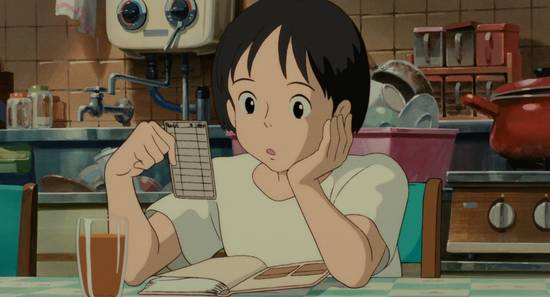
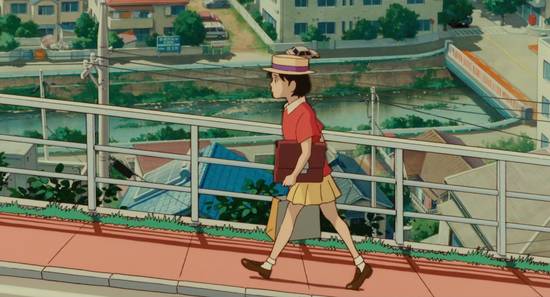
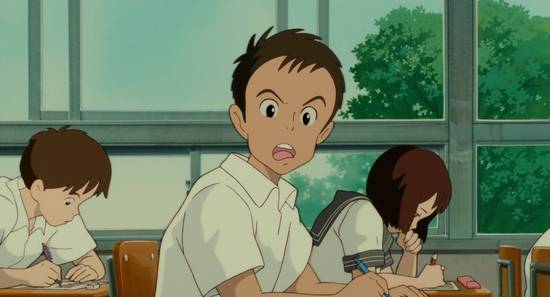
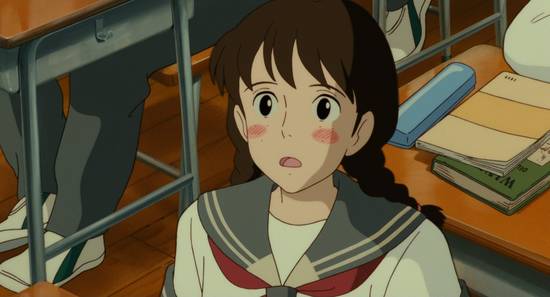
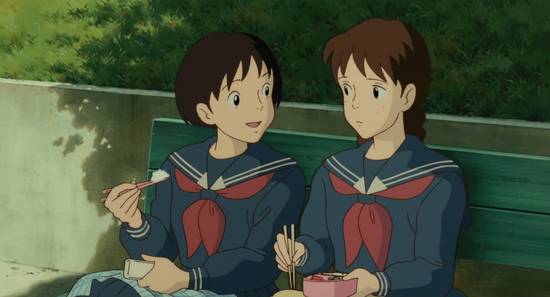
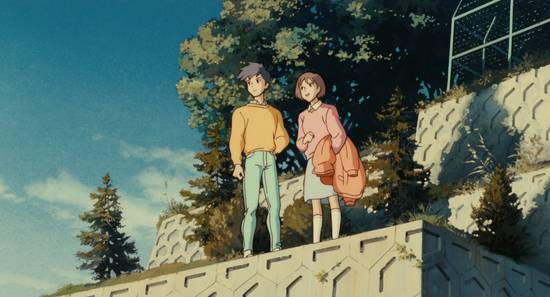
Your Opinions and Comments
Be the first to post a comment!